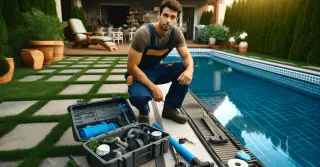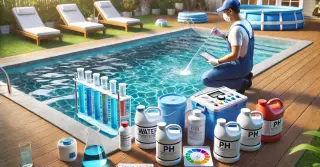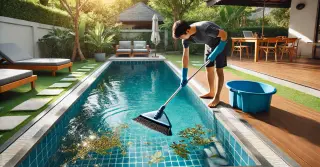Routine pool maintenance is vital for ensuring a clean, safe, and pleasant swimming environment. Failing to maintain your pool can result in algae growth, cloudy water, and equipment failures. By following a regular maintenance schedule, you can prevent these problems and ensure a healthy pool.
Key Cleaning ActivitiesMaintaining a clean pool requires regular cleaning tasks. These tasks help eliminate debris, prevent algae, and maintain clear water.
- Skimming and Brushing: Consistent skimming removes leaves, insects, and other floating debris from the pool's surface. This prevents debris from sinking to the bottom and causing further contamination. Brushing the pool surfaces eliminates dirt, algae, and buildup that can lead to stains and slippery areas. Routine skimming and brushing keep your pool looking its best and prevent algae growth.
- Bottom Cleaning: Cleaning the pool floor with a vacuum removes dirt and debris that has settled to the bottom. Using an automatic pool vacuum makes this easier, but manual vacuuming may be necessary for thorough cleaning. Routine vacuuming ensures clear water and prevents debris accumulation.
Chemical BalanceEnsuring balanced pool water is essential for swimmer safety and comfort. Proper chemical levels prevent algae growth, bacteria, and other contaminants, and safeguard pool surfaces and equipment.
- Regular Chemical Testing: Regularly testing the pool water for chlorine, pH, alkalinity, and calcium hardness is vital. Adjust the chemical levels as needed to keep the water balanced. Using a reliable test kit helps you accurately measure these levels, so you can make the right adjustments.
- Pool Shock Treatments: Shock treatments involve a high dose of chlorine being added to the pool to eliminate bacteria, algae, and other contaminants. This is especially important after heavy pool use or severe weather. Regular shocking keeps the water sanitized and safe for swimming.
Filter MaintenanceYour pool's filtration system is essential for maintaining clean water. Regular maintenance of the filter maintains its efficiency.
- Cleaning Filters: Depending on the type of filter you have—cartridge, sand, or DE—cleaning methods differ. Cartridge filters must be removed and rinsed to clear dirt and debris. Sand and DE filters must be backwashed to remove trapped particles. Frequent filter cleaning keeps the system running smoothly and ensures clear water.
- Changing Filter Media: Over time, the filter media will need to be replaced. Sand filters need new sand every 3-5 years. Cartridge filters require replacement every 1-2 years. DE filter grids require replacement every 3-5 years. Regularly replacing the filter media ensures peak filtration and water clarity.
Regular pool maintenance is crucial for a safe and enjoyable swimming environment. By implementing a regular maintenance plan, you can ensure your pool remains in top condition for years to come.



